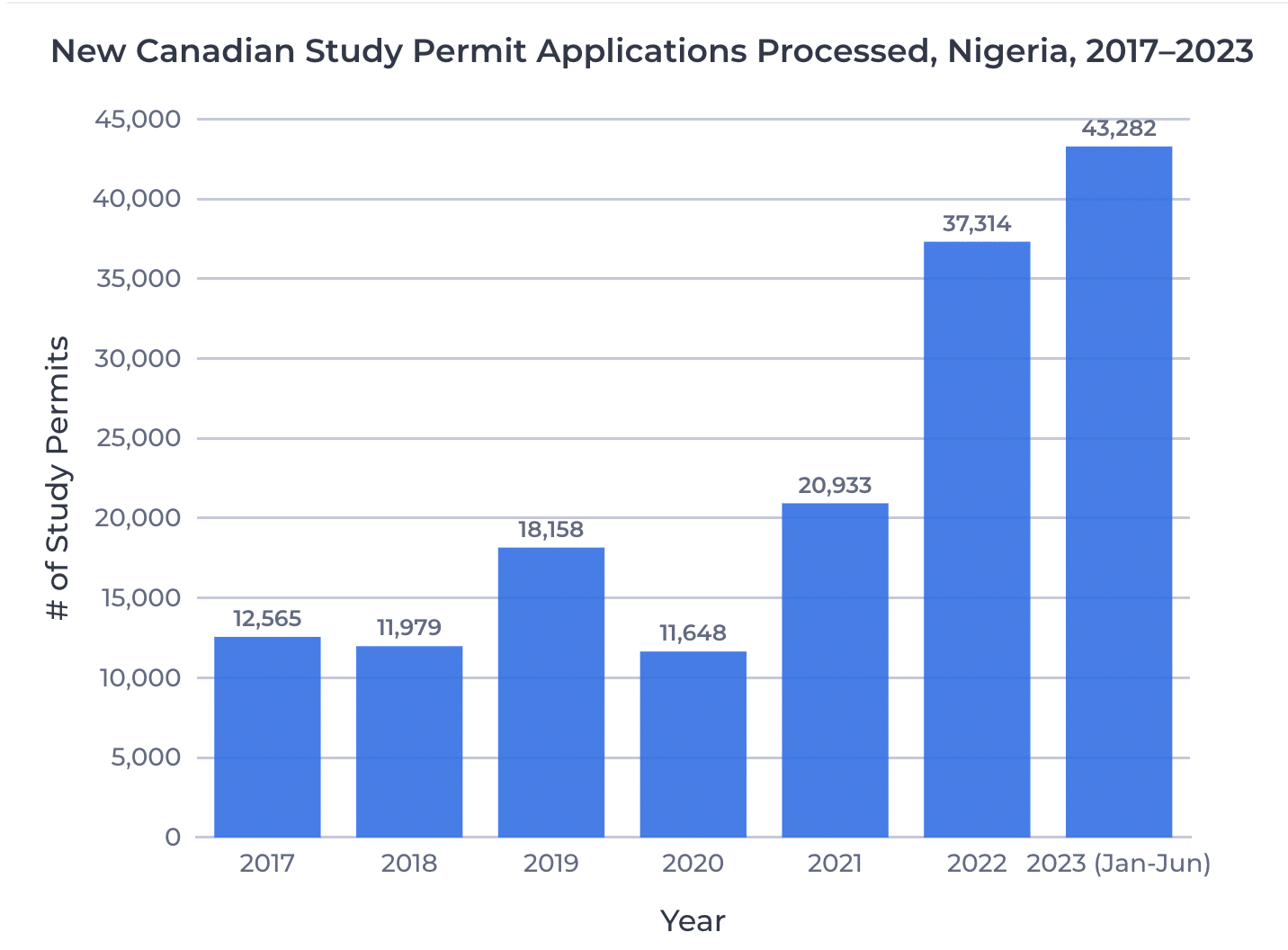Nigerian students critical to ongoing success of Canada’s international education sector
Nigerian international student numbers in Canada are increasing at a significant rate.
Discover your options to study in Canada
In 2019, the Canadian government issued just over 3,000 student visas to Nigerian nationals. By 2021, that number doubled and in 2022, it doubled again. With record numbers of international students coming to study in Canada, Nigerians have become the country’s fastest-growing student population.
ApplyBoard has published an article that examines student mobility trends for Nigerian students. The notable insights include:
- Nearly 18,000 Canadian study permits were issued to Nigerians in the first six months of 2023, more than for any other country but India.
- Nigerians were Canada’s fastest-growing international student population from January to June 2023, with 44% more study permits issued during that period than in all of 2022.
- Study permit approval rates for Nigerians continued to rise across the first six months of 2023, to just under 40%. That’s more than double what approval rates were in 2020.
- Nigerian students are more evenly distributed across Canada than average. Manitoba, Nova Scotia, Saskatchewan, and New Brunswick each accounted for more than 5% of study permits issued to Nigerians from January to June 2023.
Approval rates for Nigerian study permits
From 2017 to 2019, Canada processed more student visa applications from Nigeria than any other country except for India and China. However, the study permit approval rate was below 20%, meaning only a small proportion of those students were able to come to Canada to study.
Approval rates in 2023 have nearly doubled. Nigerian students have submitted more than 43,000 study permit applications in the first six months of 2023, making them likely to become Canada’s second largest cohort of inbound students.
The chart below shows the growth in study permit applications since 2017.

Nigerian students coming to Canada largely depends on approval rates. According to ApplyBoard, insufficient finances were cited as a refusal reason in 74% of study permit refusals for Nigerians in 2021 and 2022.
Last year, the Canadian government came under scrutiny for its low student visa approval rates for African students. This led to a study by the House of Commons Standing Committee on Citizenship and Immigration, which laid out recommendations for improving the fairness and transparency of the study permit approval process. Since the pandemic, approval rates have been on the rise for African countries.
Where Nigerian students are choosing to study in Canada
Eight out of 10 provinces saw more study permits issued to Nigerian students in the first half of 2023 than in all of 2022. The most notable growth is Nova Scotia, with more than twice as many study permits issued in all of 2022. This was the third most after Ontario and British Columbia.
Although Ontario and British Columbia were top study destinations, Nigerians were far less concentrated in those areas than average.
Across Ontario, British Columbia, the prairie provinces and Atlantic Canada, Ontario and BC accounted for around 63% of study permits issued to Nigerians in the first six months of 2023. This is in comparison to nearly 84% of students who chose those two provinces as a destination across all countries of origin.
How are Nigerian students important to Canada’s international education sector?
Canada has issued more than 6,500 study permits to Nigerian students in the first half of 2023, already a record for the full year.
Given the increasing centralization trend of international students to study at Ontario universities and colleges, ApplyBoard believes that the Nigerian student population is important for maintaining the international education sector in other provinces, therefore benefitting Canada as a whole.
Furthermore, the United Kingdom recently announced that it would prohibit most international students from bringing dependents into the country. As Canada’s largest competition for Nigerian students, this creates an opportunity for Canada to secure a significant recruitment advantage and continue welcoming record numbers of Nigerian students.
Nigerian permanent residents in Canada
In 2022, Nigeria ranked as the fourth most popular immigrant source country of new permanent residents in Canada, after India, China and Afghanistan. In particular, Canada welcomed 22,085 new permanent residents in 2022, making up over 5% of Canada’s total permanent resident number.
One of the main benefits of studying in Canada as an international student is the ability to utilize the Post-Graduation Work Permit (PGWP) after completing an education program and the opportunity to be granted permanent residence in Canada.
PGWPs are the main way for international students to work in Canada upon graduation from a Canadian Designated Learning Institution (DLI). The PGWP is an open work permit that allow holders to work for any Canadian employer of their choice for a maximum of three years.
The work experience gained through a PGWP is very beneficial for prospective PRs, as many permanent resident pathways in Canada directly reward candidates who possess Canadian work experience. According to Statistics Canada’s data, “almost three-quarters of all PGWP holders became permanent residents within five years of having obtained their PGWP”.
- Do you need Canadian immigration assistance? Contact the Contact Cohen Immigration Law firm by completing our form
- Send us your feedback or your non-legal assistance questions by emailing us at media@canadavisa.com







